CLAS 357
Autocracy (Caligula)
March 20, 2024
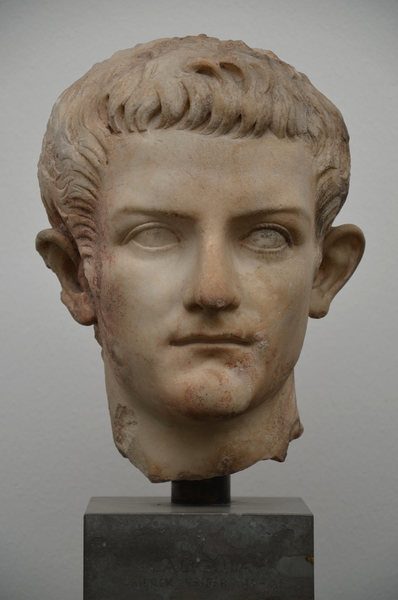
Response #2 (due Friday, March 22 @1:59pm in D2L)
history's ample supply of/demand for autocrats/authoritarians:
demand, e.g. "A Night at the Garden" (documentary by Marshall Curry, 2017): 20,000 Americans at Madison Square Garden; Fritz Kuhn, leader of The German American Bund, promoting interests of Nazi Germany (February 20, 1939): https://anightatthegarden.com (2019 New Yorker story)
supply, e.g. Steve Raucci's rise & fall as Head of School Maintenance "energy czar", Schenectady, NY: NPR's This American Life 2010 podcast (transcript)
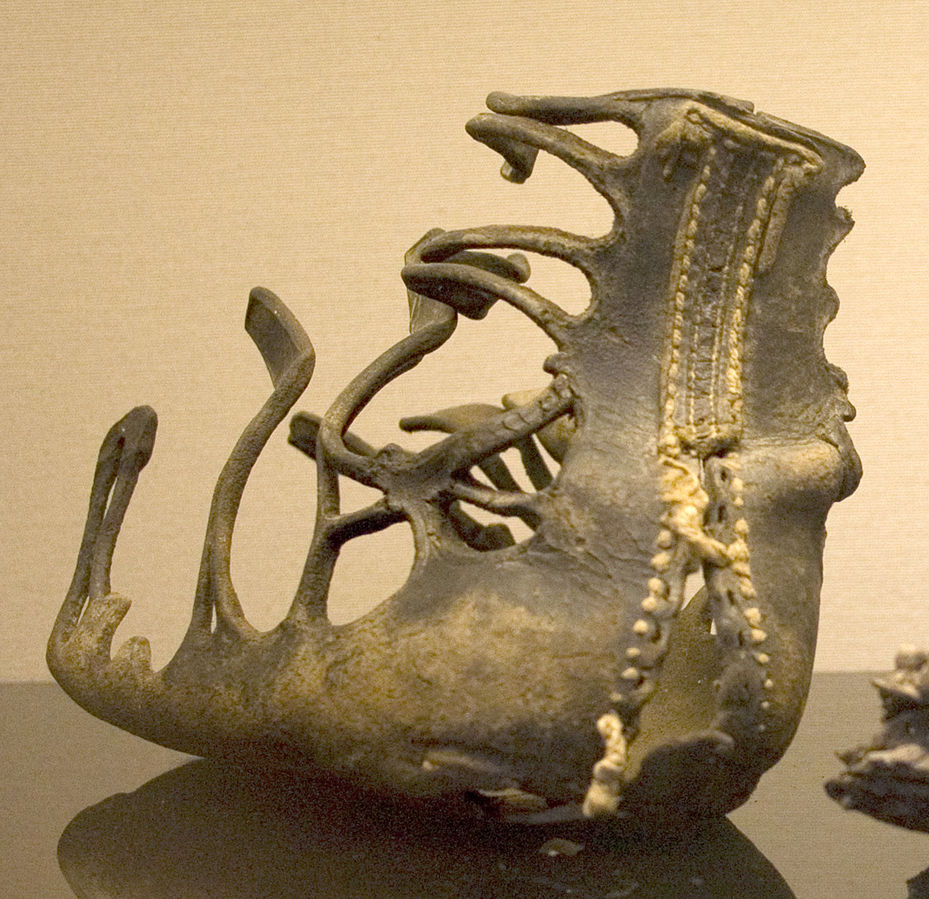
caliga (Roman Egypt , 1st BCE-1st CE)
Caligula ("Little Boot(s)", Gaius Julius Caesar, 12-41 CE)
- son of popular Germanicus (15 BCE-19 CE): succeeds Tiberius' (lived at Tiberius' Villa Jovis on Capri), "So obsequious was he to his grandfather and the latter's courtiers that it has fairly been observed of him that there has never been a better slave—nor a worse master" (10)
- early reign: wide acclaim post-Tiberius, "he was the answer to the prayer of the Roman people" (13); populist (economic transparency, free speech, tax cuts, elections, judicial reforms, gladiatorial games, circuses & theater + banquets & free gifts, infrastructure projects (15-18)
- achieves unlimited power (senate, army, people; end of "principate"): Caligula's reign of terror (4yrs. as "bad master") – killed by Cassius Chaerea & Praetorian Guard (age 29); uncle Claudius ("preserved for jokes") proclaimed emperor; Caligula first of failed emperors (micro-managing, pushing limits of power, humiliating elite classes)
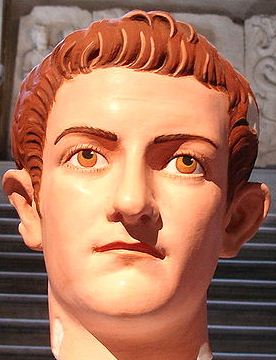
Reconstruction of ancient bust of Caligula
Caligula's personal characteristics & behavioral tendencies (according to Suetonius)
- lack of impulse control (sadism, cruelty): threat to grandmother, "Remember, I can do anything I please to anybody" (29); executions,"Strike him so he feels his death" (30); random acts of viciousness, "at a public banquet, finding a slave had stripped off some silver from the couches, he at once handed him over to an executioner to have his hands cut off and hung in front of him around his neck, and he was led around among the banqueters, preceded by a placard indicating the nature of his offence" (32)
Suetonius, Caligula 27
Many men of honourable rank he first had disfigured with the marks of branding irons and then condemned to the mines, to road-building, or to the beasts or else he would
force them into cages on all fours like animals, or have them sawn in half. Nor was this always for some serious offence but sometimes merely because they had not liked one of his shows or because they had never sworn by his Genius. He obliged parents to witness the execution of their own children and when one man excused himself on the grounds of ill health he had a litter sent to collect him.
- elimination of rivals (23); "Whenever he kissed the neck of a wife or a mistress, he would add: 'This lovely neck would be severed the minute I gave the order'" (33)
- delusions of grandeur/divinity: declares himself Rome's god against imperial practice (temple in Rome, statues of head on Jupiter's body, 22), "by night he would repeatedly invite the full and shining moon to share his bed and his embraces, in the daytime he used to talk privately with Capitoline Jupiter, sometimes wispering to him, then offering his own ear in turn for reply, at times speaking quite loudly and even cursing. For his voice was heard threatening: 'Raise me up or you I'll . . .'" [cf. Homer, Iliad 23.724] (22)
Malcolm McDowell, "I am a god", in Caligula (1979; director Tinto Brass, cast includes Helen Mirren (as fourth wife Caesonia), Peter O'Toole, Sir John Gielgud):
https://www.youtube.com/watch?v=NJvVEt6F_Xw

Malcolm McDowell as Caligula (1979)
Caligula's elimination of his rivals for "treason": https://www.youtube.com/watch?v=Yk8_mtwxztY
- disruption of social norms: style of dressing conflates divine/human, male/female, etc. (52); love of chaos, "every now and again he would express his desire for a terrible military defeat, a famine, a plague, a great fire, or an earthquake" (31)
Suetonius, Caligula 52
In his clothes, his footwear, and other aspects of his personal adornment his practice never conformed to the traditional manner of his sex, sometimes departing from what was appropriate to his sex, sometimes even from what was right for a mortal . . . He was often to be seen with a gilded beard, holding a thunderbolt, a trident, or a caduceum— the emblems of the gods—and sometimes in the regalia of the goddess Venus. He frequently sported the robes of a triumphant general, even before he went on campaign, and sometimes the breastplate of Alexander the Great, which he had taken from his sarcophagus.
- absence of sexual boundaries: incest with sisters (esp. Drusilla); displays wife Caesonia to soldiers & friends naked (25); serial adultery & sexual omnipotence, esp. with wives of prominent men & families (36, 41)
Suetonius, Caligula 36
He is said to have had sexual relations with Marcus Lepidus, the actor Mnester, and a number of hostages—giving and receiving pleasure in turn. Valerius Catullus, a man of consular family, proclaimed publicly that he had buggered the emperor and was quite exhausted by his sexual demands . . . In addition to his
incestuous relations with his sisters and his notorious affair with the prostitute Pyrallis, there was hardly any woman of distinguished family he did not make advances to. Most of them he invited to dinner, along with their husbands, and as they passed by the foot of his couch, he would appraise them carefully—as if he were buying slaves, sometimes raising their faces with his hand, if they had cast their eyes modestly downwards. Then, as often as he felt like it, he would leave the dining-room, having called to him whichever woman he found most attractive. Not long afterwards he would return, making no attempt to conceal the signs of his present sexual activity, and would offer criticism or praise of his partner, listing in detail the good or bad features of her body and sexual performance. To some women he himself sent a divorce notice, in the name of their absent husbands, and gave orders that these notices were to be entered in the public records.
.jpg)
Marble bust of Caligula in corona civica (37-41 CE)
- jealousy, envy, vanity: destroyed statues of famous men & denigrated classical authors (Homer, Vergil, Livy, 34; Seneca, 53)
Suetonius, Caligula 35
Whenever he came across men with a good head of hair, he had the backs of their heads shaved to spoil their appearance . . . there was no one, however humble his rank, however wretched his lot, whose advantages Caligula did not resent.
Suetonius, Caligula 50
His hair was sparse, his crown being completely bald, while the rest of his body was hairy. Because of this he pronounced it a crime meriting death if, when he was passing, anyone should look down on him from above, or if, for whatever reason, the word 'goat' was mentioned.
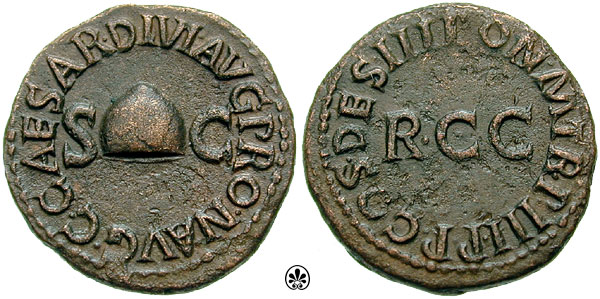
Quadrans celebrating Caligula's abolition of a tax (38 CE)
- extravagant displays of wealth & power: gold loaves of bread as gifts (37); rolling on gold coins (42); grandiose building projects ("Great structures were built up in hostile and deep waters, mountains of the hardest flint were tunneled through, while plains were raised to the level of mountains and excavations levelled mountain peaks flat", 37)
- financial corruption & greed: revocations of citizenship, maneuvers to confiscate estates, forged wills, bogus auctions (38)
- inconsistency & whimsical acts: parody of military (43-48), e.g. staged triumphs and random order for soldiers to gather seas-shells at seashore of English Channel (Ocean's spoils to Rome?), lavish treatment of favorite circus horse Incitatus (55)
- cowardice: "greatest arrogance and the greatest timidity" (fear of storms, gods, barbarians, 51)
- humorlessness & censorship: "He had a composer of Atellan drama burnt to death in a fire in the middle of the arena because one of his lines of verse contained a doubtful joke" (27)
- resentment at past slights: pontoon bridge at Bay of Baiae ("when pigs fly" prophecy re Caligula's rule & riding horses across the bay, 19)
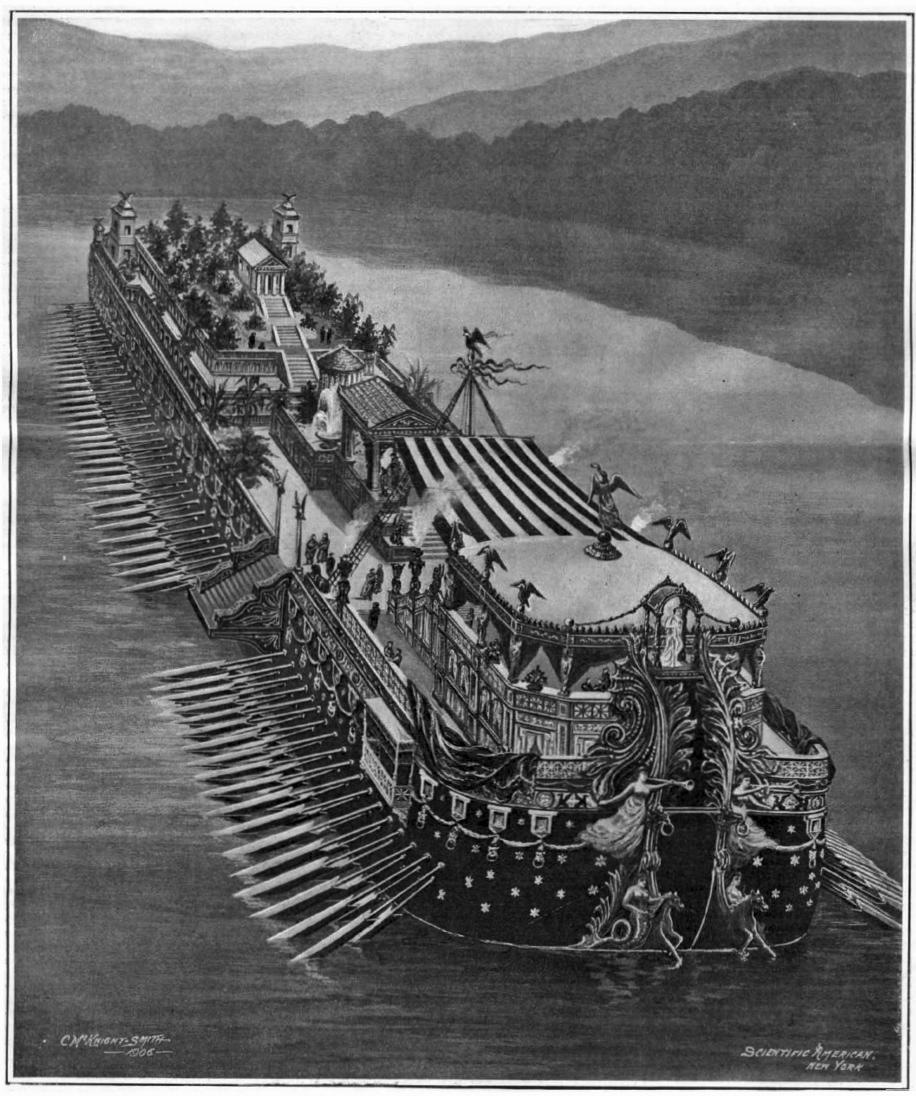
Reconstruction of one of Caligula's palatial ships (Lake Nemi, 1906)
Caligula's victims (according to Suetonius)
Kim Jong Un's running bodyguard: https://www.youtube.com/watch?v=u8y8ndgk9DU
- upper classes targeted, e.g. senators forced to run alongside chariot, serve him dinner in short linen tunics (26) & extreme tortures (branded bodies, beasts in cages, 27); brothel on Palatine (respectable women and free-born boys, 41)
- people of all classes: megalomania results in closed granaries, awnings drawn back at gladiator shows, riots at games (26); monopolization of vehicles to move palace furniture leads to bread shortage (39); executed Proculus for impressive size, jealous of celebrity gladiators (35); extreme taxes on all classes, including on prostitutes & pimps (40), mistreatment of older soldiers (44)
"If only the Roman people had a single neck" (30)





.jpg)

